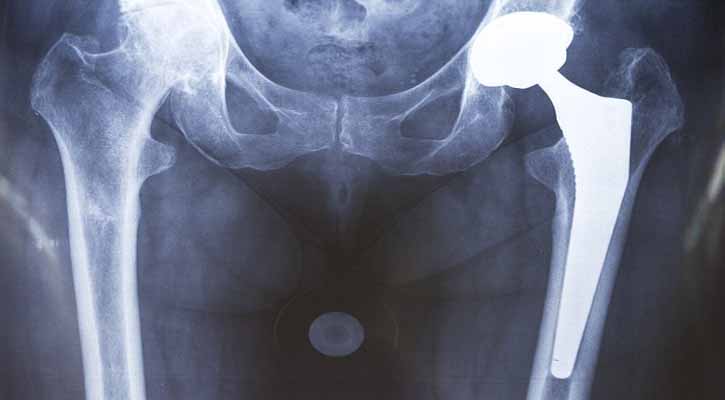Hip operations banned if you can sleep
4 || risingbd.com

Risingbd Desk: Patients will be denied hip or knee replacements unless their pain is so severe they cannot sleep through the night.
Three health trusts are drastically tightening their rules in the hope of slashing operations by a fifth and saving £2million a year.
Patients will be referred for operations by GPs or hospital doctors only if their pain is so severe it interferes with their 'daily life' or 'ability to sleep'.
The proposals have been drawn up jointly by the Redditch and Bromsgrove, South Worcestershire, and Wyre Forest Clinical Commissioning Groups – three local health trusts in the West Midlands.
But it is understood that health managers in other parts of England have quietly imposed similar policies.
They include the Harrogate and District, Vale of York, Coastal West Sussex and Shropshire CCGs, which are also using a controversial scoring system to rank patients' pain for knee and hip operations.
The Royal College of Surgeons estimates that as many as four in ten health trusts in England are now denying operations for patients who are not in sufficient pain, or are very overweight.
Around 100,000 patients have hip and knee replacements on the NHS every year; both operations cost around £5,000 each.
The majority of patients have either severe arthritis or have fractured their joints and struggle to carry out basic daily tasks.
When assessing eligibility, doctors are usually required to complete a questionnaire on behalf of their patient to estimate the extent of their pain and ability to walk. It is known as the Oxford Points System.
Doctors then work out a score based on the answers of between 0 and 48. The lower the number, the worse the patients' pain and mobility.
As well as using the score, doctors are also meant to consider other criteria such as how the patient feels and the way they walk into the room.
In the case of the three West Midland CCGs, they are aiming to cut the score at which their patients are eligible for surgery from 30 to 25. They are also using the score as the sole criteria for eligibility.
The plans – uncovered by the Health Service Journal – are aimed at preventing an extra 353 patients having hip and knee operations each year.
Documents drawn up by three CCGs explain that the rules present an 'opportunity to reduce hip and knee replacement expenditure'. If properly enforced, procedures on hips will be cut by 12 per cent and those on knees by 19 per cent, the documents suggest.
'A reduction of hip and knee scores to less than 25 will achieve a 12 per cent and 19 per cent decrease in patients eligible for hip and knee surgery respectively,' they say.
They add that a score of less than 25 means that a 'patient's pain and disability should be sufficiently severe that it interferes with the patient's daily life and or ability to sleep'.
The Daily Mail discovered yesterday that other CCGs are employing similar policies for hip and knee replacements, including Harrogate and Rural District, the Vale of York, Coastal West Sussex and Shropshire. They are also lowering their eligibility score on a similar questionnaire-style system.
Mr Stephen Cannon, vice president of the Royal College of Surgeons, said: 'This policy is the latest demonstration of how NHS financial pressures are directly affecting patients.
'Delaying access to surgery also adversely affects a patient's quality of life and surgical outcomes, meaning the operation may not be as beneficial as if it had been carried out earlier.'
Dr Liam O'Toole of Arthritis Research UK, said: 'Everyone experiences pain in different ways. Someone experiencing less pain might have more damage to their joint.
'People's access to this life-changing surgery that reduces pain and restores independence should be based on their clinical need alone.'
Caroline Abrahams, charity director of Age UK, said: 'It is very worrying to hear that in some areas hip and knee surgery is being restricted.
'If you need one of these operations you are likely to be in a lot of discomfort and pain, and highly restricted in what you can do. Your mobility is bound to be affected and for older people that can threaten their ability to go on living independently – a terrible price for them to pay.'
The new policy will also ban patients from having hip and knee replacements if they are severely obese, with a Body Mass Index of more than 35. Obesity is defined as a BMI of above 30, overweight is 25 to 29, while normal is below 25.
Patients who are severely obese will be allowed the operations only if they manage to lose at least 10 per cent of their body weight.
A report by the Royal College of Surgeons in 2014 estimated that 44 per cent of the 209 CCGs in England required patients to be in a certain amount of pain – or lose weight – before at least one type of operation.
But policies are becoming stricter. Last year the Vale of York CCG began restricting all types of surgery from patients who were obese – BMI over 30 – or who smoked. Similar rules are being considered by Richmond CCG in South-West London.
A spokesman for Redditch and Bromsgrove CCG said: 'The CCG has reviewed the criteria for those patients requiring hip or knee replacement surgery.'
They added that patients may 'benefit from physiotherapy and weight loss before considering surgery. If a patient feels that they require this surgery but do not meet these criteria, there is a clear appeals system via individual funding requests whereby the effects can be considered upon the patient and the decision made regarding eligibility for funding.'
Source: The Mail
risingbd/Jan 30, 2017/Mukul
risingbd.com























